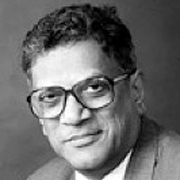I was born and raised in Goa, a former Portuguese territory on the west coast of India. The Portuguese conquered Goa in 1510 and were forced out of Goa by the Government of India, in an act of war in 1961. Like virtually half of the Goan population at that time, I grew up speaking two languages, Portuguese and the native Konkani, and as a Roman Catholic whose ancestors had converted to Christianity from Hinduism four centuries ago. Hindus and Christians, speaking, to varying degrees, two languages, Portuguese and Konkani, had made Goa the site of their cultural marriage. At home, in school, and in the community I grew up in. and lived in, a bicultural and bilingual world, and my perceptions became multi-focal from a very young age.
After graduating from the Liceu Nacional, I studied medicine at the Goa Medical School, the oldest school of western medicine in Asia and the alma mater of both my physician father and grandfather. The end of Portuguese rule and the beginning of Indian administration introduced the English language as a major vehicle of communication and the residuals of the Indian colonial experiences under British rule. It was painfully obvious to me that my most important challenge was to master the English language and re-learn medicine in this language.
Both the excitement of broader horizons and the pain of a lonesome uniqueness dictated many of my lifetime decisions. Probably the most important decision was my emigration to the United States to become an academic psychiatrist, an eye-opening, and, in many ways, a liberating experience that resurrected my search for identity in a rapidly changing multicultural environment. I was fortunate to be admitted to Johns Hopkins University, for graduate study under Dr. Paul Lemkau, leading to the degree of Doctor of Science in Mental Health. At the Johns Hopkins School of Public Health I met colleagues from all over the world, made many friends who later pursued public health careers in their native countries I gained insight into the struggles of underserved populations, and a better understanding of innovative programs to meet their needs.
After graduation I was once again fortunate to obtain a National Research Service Award from the National Institute of Mental Health, for postdoctoral study in geriatrics and psychiatric epidemiology at Columbia University, with Drs Barry Gurland and Bruce Dohrenwend. After this exciting year in New York City I returned to Johns Hopkins to complete a residency-training program in psychiatry, where I learned clinical psychiatry from Dr Paul McHugh and his disciples and from Dr Jerome Frank.
Interestingly, images from my Indo-Portuguese cultural upbringing followed me throughout my career. In New York City, I was astonished to discover two pieces of furniture built in the Goan Indo-Portuguese style of the 16th and 17th centuries in the Hispanic Museum in Washington Heights. At Johns Hopkins, also, my residency director, Dr Phillip Slavney, surprised me by speaking to me in Portuguese, and one of my best friends during my residency was Bruno Lima, a fellow resident from Brazil, who, like me, spoke Portuguese.
After another year as a Senior Staff Fellow at the National Institute on Aging, I moved to Connecticut and have been here since 1981, as a faculty member at Yale, where I teach consultation-liaison psychiatry to residents and medical students. It was in Connecticut that another Landmark event in my career took place. I met Dr Ronald Wintrob, who at the time was Professor of Psychiatry at the University of Connecticut and who gave me a new impetus to pursue my passion for cultural psychiatry. Heraclitus believed that the character of a person defines his or her life, an idea further developed by Sigmund Freud centuries later. Having grown up in Goa, my clinical and academic endeavours were fated to be a logical extension of my bicultural upbringing.
My professional life has been devoted to the study of demoralization and to topics related to cultural psychiatry, geriatrics, and consultation-liaison psychiatry. I also have a strong interest in the history of medicine, particularly in the study of the interaction of Western and Indian (Ayurvedic) medicine in Goa in the 16th and 17th centuries.
How I ended up studying demoralization is a story by itself. I first learned about demoralization when my esteemed teacher, Dr Jerome Frank, honored me by giving me two of the best presents I ever received; his books, Persuasion and Healing and Sanity and Survival. He had been arguing that the complaints that induced many patients to seek psychotherapy were expressions of demoralization, irrespective of their psychiatric diagnosis. Luckily, I stumbled on the topic of demoralization again when another teacher, Dr Bruce Dohrenwend, proposed that the common dimension measured bypsychiatric screening scales was demoralization, or something akin to it. Dr Paul McHugh’s lectures, his humanistic approach and his stimulating intellect further enhanced my curiosity about the life stories of my patients, about the pathoplastic aspects of their personalities, and about my own life story, starting as a bicultural child and growing up to become a multicultural adult.
Many well-intentioned friends had discouraged me from studying demoralization, a concept that had no place in the DSM and, from their perspective, would probably never gain widespread acceptance in psychiatry,let alone research grant funding. However, the impulse given to my curiosity by my teachers was too strong to be resisted and I decided to overlook my friends’ scepticism. I was fortunate to have several of my articles on this concept accepted for publication in peer-reviewed journals, and today demoralization is widely recognized as an important construct for the understanding of the boundary between the homeostatic and the pathological responses to stress.
The study of demoralization is the unifying theme that brings together my explorations in cultural psychiatry, geriatrics, consultation-liaison psychiatry, and the history of medicine. Time and again, research has shown that disintegration of cultural patterns is associated with an increase in the prevalence of demoralization. Social isolation and/or breakdown of social supports cause demoralization to be more likely to occur as people age.
Demoralization has been widely studied in patients suffering from a variety of medical and surgical problems, and has been shown to be closely linked to the prognosis of several illnesses.
In the 16th and 17th centuries, when Europeans suffered from tropical diseases in Goa, they went to Ayurvedic physicians whom they trusted more than their European counterparts, and who skilfully alleviated their suffering, to some extent, by restoring their morale. The essence of being human, as Ernest Cassirer noted, is the ability to symbolize. Cultural formulations enable us to reconstruct the universe of meanings that surround the patient’s symptoms and behaviours, the “meaningful connections”, to borrow an expression from Karl Jaspers, between the patient’s past, present and future, and between the person and the environment.
Throughout my life I was fortunate to have teachers, mentors and colleagues who have been a constant source of inspiration and encouragement. They gave me the gift of knowledge, the courage to pursue the truth, and the fortitude to persist in my research.
These are blessings I will never be able to return, but I have tried my best to pass on to my own students and residents, as our never-ending fight against disease and suffering continues. Above all, I am grateful to my patients who have been my best teachers by demonstrating their heroic resilience in overcoming the stigma of mental illness and barriers to their self-fulfilment.

